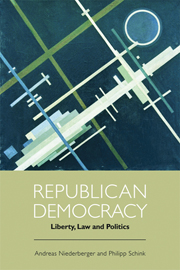Book contents
- Frontmatter
- Contents
- List of contributors
- Introduction
- 1 The Tension between Law and Politics in the Modern Republican Tradition
- 2 Impotence, Perspicuity and the Rule of Law: James Madison's Critique of Republican Legislation
- 3 Kant, Madison and the Problem of Transnational Order: Popular Sovereignty in Multilevel Systems
- 4 Republicanism and Democracy
- 5 Two Views of the City: Republicanism and Law
- 6 A Kantian Republican Conception of Justice as Nondomination
- 7 Two Republican Traditions
- 8 Freedom, Control and the State
- 9 Legal Modes and Democratic Citizens in Republican Theory
- 10 Rights, Republicanism and Democracy
- 11 Republicanism and Global Justice: A Sketch
- 12 Republicanism and Transnational Democracy
- Index
6 - A Kantian Republican Conception of Justice as Nondomination
Published online by Cambridge University Press: 05 October 2013
- Frontmatter
- Contents
- List of contributors
- Introduction
- 1 The Tension between Law and Politics in the Modern Republican Tradition
- 2 Impotence, Perspicuity and the Rule of Law: James Madison's Critique of Republican Legislation
- 3 Kant, Madison and the Problem of Transnational Order: Popular Sovereignty in Multilevel Systems
- 4 Republicanism and Democracy
- 5 Two Views of the City: Republicanism and Law
- 6 A Kantian Republican Conception of Justice as Nondomination
- 7 Two Republican Traditions
- 8 Freedom, Control and the State
- 9 Legal Modes and Democratic Citizens in Republican Theory
- 10 Rights, Republicanism and Democracy
- 11 Republicanism and Global Justice: A Sketch
- 12 Republicanism and Transnational Democracy
- Index
Summary
No one has done more to situate republicanism firmly within the contemporary landscape of political theory than Philip Pettit. His version of freedom as nondomination proves powerful and fruitful in a number of ways and contexts, including that of global political structures. But my (long and not very elegant) title points to two questions about Pettit's approach and to two answers that I will suggest. To begin with the first: If republicanism is presented not just as a partial, but as a general theory of legitimate government, why does it not imply a notion of justice with respect to a basic social and political structure or to transnational relations and structures? I propose a certain hypothesis as to why this might be the case, and I also argue that a republican conception of justice is congenial to Pettit's approach and is called for in any case. This is because justice is, as Rawls (1999, 3) rightly argued, the first virtue of social institutions, and it is only on the basis of considerations of justice that one can justify the kinds of freedom, equality or other values participants in a context of justice owe one another.
My second question delves further into the very basis of a republican conception of justice as nondomination and locates it within the principle of justification, which says that no one should be subject to norms or normative arrangements that cannot be properly justified to him or her as a free and equal agent of justification.
- Type
- Chapter
- Information
- Republican DemocracyLiberty, Law and Politics, pp. 154 - 168Publisher: Edinburgh University PressPrint publication year: 2013



